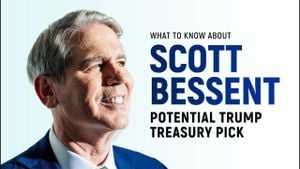Kemi Badenoch endured another challenging session at Prime Minister's Questions (PMQs) as she faced off against Labour leader Keir Starmer, showcasing the tough realities of political sparring.
The atmosphere was palpable as Badenoch, the new Conservative leader, struggled to find her footing during her second PMQs appearance on November 13, with Tory MPs visibly subdued behind her. This follow-up came just a week after her initial session where she faced significant criticism over her performance.
During her latest exchange with Starmer, Badenoch reiterated her criticisms of the recent hike in employers' National Insurance. Starmer, quick to respond, reminded Badenoch of the Conservative Party's own vote against the Budget package just days prior.
“We produced a Budget which does not increase tax on working people,” Starmer laid out, framing his party's economic stance as forward-looking—an argument meant to insulate Labour from the Conservative's past budgetary mismanagement. He mentioned investments aimed at improving the National Health Service (NHS) and education, emphasizing, “If she is against those things, she should say so.”
Kemi Badenoch’s reply was somewhat evasive. “I’m not against any of those things, of course not, none of us are against any of those things,” she stated, which left critics—like Labour chair Ellie Reeves—accusing her of trying to “have her cake and eat it.” Reeves pointedly questioned how the Tories expected to garner the benefits of the Budget without siding with it. “It’s the same old Tories,” she remarked, urging transparency on where the money for these investments would come from.
This back-and-forth moment encapsulated the challenges the Conservative Party faces: reconciling its past actions with present criticisms appears easier said than done. Earlier during the session, Badenoch was caught stumbling when she mistakenly claimed the Budget had omitted any mention of defense. Starmer was ready with his rebuttal, highlighting again the inconsistency of Badenoch’s remarks and pointing out her apparent lack of awareness.
The criticisms of Badenoch’s performance became accentuated as the questions unfolded. One of her attempts to draw on real-world examples—specific cases from businesses—seemed poorly timed and lacked the emotional weight necessary to resonate with either the public or her party colleagues.
While attempting to focus on the concerns of small businesses potentially crippled by National Insurance changes, Badenoch reminded the assembly of hypotheticals rather than concrete solutions. It felt too scripted, lacking improvisation or genuine connection, and she missed the opportunity to solidify her stance on economic issues.
By the time the session concluded, the absence of impactful dialogue or proactive engagement from Badenoch was glaring. She had reverted to highlighting elements from the past week—specifically, critiques of Labour policies—rather than seizing the opportunity to position herself and her party within current discussions.
Starmer's adeptness at keeping the conversation firmly within his party’s initiative cast shadows over Badenoch’s approach. A telling moment occurred when she brought up the potential fallout for local councils stemming from the National Insurance increase; Starmer simply played it down stating, “If she’s going to complain about scripted answers, it’s probably best not to read from a script.”
Her rhetorical strategy fell short, leaving Badenoch needing to recalibrate her approach if she wishes to remain competitive. Political pundits have echoed this sentiment, remarking on how her confrontational style felt out of place without substantial information backing it up. Sometimes, it might be easier to engage with detailed, straightforward questions rather than dig deep for culture war scraps.
Conversely, other political figures, like Liberal Democrat leader Ed Davey, strategically focused on similar topics but did so with less aggressive posturing. His measured tone and factual queries aimed for solutions prompted more tangled responses from Starmer.
Comparing this, Badenoch's attempts to launch jabs, like referring to Labour's economic strategy as riding the “Magic Money Tree,” seemed forced and unconvincing without real depth. It hinted at her need to find more engaging elements to the discussions than dry rhetorical gestures.
After witnessing yet another disappointing session, analysts suggested Badenoch should perhaps borrow from her fellow politicians' approaches, particularly those who prioritize clarity over confrontation. To regain ground and credibility, it may be wise for her to refocus on burning current issues, from cost of living to healthcare shortages, rather than stick to tired attacks from previous actions.
Her rhetorical grit is evident, but the lack of substantial follow-through begs the question of how long she can continue pursuing this method before it becomes counterproductive. Kemi Badenoch's PMQs experience reflects not just her struggle but the larger narrative within the party—one that's grappling to merge its past decisions with the immediate future it's attempting to create.
For the Conservative Party, the narrative emanates from Badenoch's performances at PMQs—specifically, two stark realities: without adapting strategy and knowing how to counter Starmer effectively, there’s little chance for them to retain voter confidence. With time, she will need to adapt her style, or risk writing off her chances at successful leadership amid relentless opposition.



